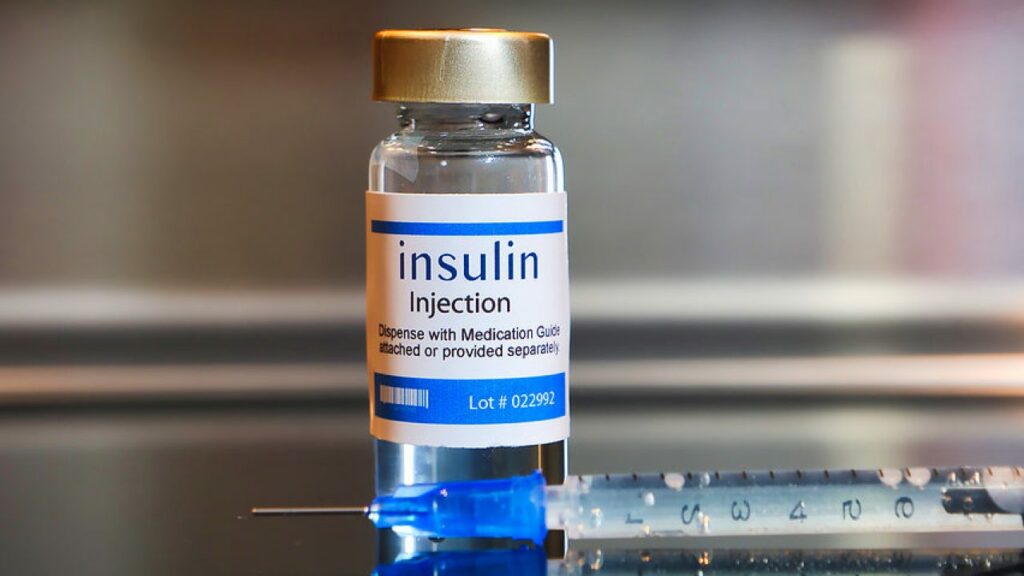Diabetes requires a delicate balance of lifestyle choices, monitoring blood sugar levels, and often, the use of insulin medications. Insulin plays a crucial role in managing diabetes by regulating blood sugar levels, but with various types of insulin available, navigating the options can be overwhelming. In this comprehensive guide, we’ll delve into the different options of common insulin medications, shedding light on their functions, and considerations for effective diabetes management.
Contents
What Are The Common Insulin Medications?
 There are several common insulin medications, each with its specific characteristics and purposes. Here is an overview of the common insulin medications:
There are several common insulin medications, each with its specific characteristics and purposes. Here is an overview of the common insulin medications:
Rapid-Acting Insulin
Rapid-acting insulins are designed to work quickly, making them ideal for controlling blood sugar spikes around mealtimes. NovoLog (insulin aspart) is known for its rapid onset and short duration, making it effective when taken just before or after meals. Similarly, Humalog (insulin lispro) and Apidra (insulin glulisine) are fast-acting options, with Humalog known for its onset within 15 minutes, making it suitable for administration just before meals.
Short-Acting Insulin
Short-acting insulin, such as Regular insulin (R), takes effect within 30 minutes of administration. It is often used to cover blood sugar increases after meals and is commonly injected before meals to assist in managing post-meal glucose levels.
Intermediate-Acting Insulin
Intermediate-acting insulin, represented by NPH (Neutral Protamine Hagedorn), has a delayed onset but provides a prolonged effect. Typically used as a basal insulin, NPH is effective in maintaining blood sugar levels between meals and overnight.
Long-Acting Insulin
Long-acting insulins, like Lantus (insulin glargine) and Levemir (insulin detemir), offer a consistent release of insulin over an extended period. Lantus is often administered once a day and provides a continuous basal insulin supply, while Levemir has a longer duration of action, contributing to stable blood sugar control.
Ultra-Long-Acting Insulin
Tresiba (insulin degludec) is an ultra-long-acting insulin with an even more extended duration of action compared to traditional long-acting insulins. This characteristic allows for flexibility in dosing time, providing a stable basal insulin level.
Premixed Insulin
Premixed insulins, such as Humalog Mix 75/25 and Novolog Mix 70/30, combine short-acting and intermediate-acting insulins in one formulation. These are convenient options for individuals who require both mealtime and basal insulin coverage, simplifying the injection process.
Inhaled Insulin
Afrezza (insulin human) is a unique insulin option administered through inhalation. This inhaled insulin provides a rapid onset. And, making it a suitable alternative for those who prefer not to inject insulin or have difficulty with injections. It is used at mealtimes to address immediate insulin needs.
Individuals with diabetes need to work closely with their healthcare providers to determine the most suitable insulin regimen based on their specific needs, lifestyle, and preferences. Regular monitoring and adjustments are essential to achieving optimal blood sugar control.
What Are Some Benefits You Can Expect?
Using common insulin medications as part of a diabetes management plan can offer several benefits for individuals with diabetes. These benefits contribute to better blood sugar control, overall health, and an improved quality of life. Here are some advantages you can expect:
- Blood Sugar Regulation: Insulin is crucial for regulating blood sugar levels. By using insulin medications as prescribed, individuals can achieve better control over their glucose levels, preventing both high and low blood sugar spikes.
- Reduced Complications: Maintaining stable blood sugar levels with insulin can help reduce the risk of diabetes-related complications. This includes a lower likelihood of cardiovascular issues, nerve damage, kidney problems, and vision impairment.
- Improved Energy Levels: Stabilizing blood sugar levels helps ensure that cells receive the energy they need. This can lead to increased energy levels, reduced fatigue, and an overall improvement in daily functioning.
- Enhanced Well-Being: Effective insulin management can contribute to an improved sense of well-being. With better control over diabetes, individuals may experience fewer symptoms, such as excessive thirst, frequent urination, and unexplained weight loss.
- Flexibility in Lifestyle: Insulin therapy offers flexibility in managing lifestyle choices, such as meal timing and content. Different types of insulin can be tailored to individual needs, allowing for greater freedom in daily activities.
- Prevention of Diabetic Ketoacidosis (DKA) and Hyperglycemia: Proper insulin use helps prevent extreme blood sugar imbalances, reducing the risk of serious complications like diabetic ketoacidosis (DKA) and hyperglycemia.
- Improved Mental Health: Stable blood sugar levels can positively impact mental health. It may reduce stress and anxiety related to fluctuating glucose levels, contributing to improved overall emotional well-being.
- Prevention of Long-Term Damage: Consistent use of insulin to manage blood sugar levels helps prevent long-term damage to organs and tissues associated with uncontrolled diabetes. This includes protection against damage to the heart, kidneys, eyes, and nerves.
It’s important to note that the benefits of insulin use may vary from person to person. A healthcare provider’s guidance is essential to developing an effective and personalized insulin management plan based on individual health, lifestyle, and preferences. Regular monitoring and communication with healthcare professionals are key components of successful diabetes management.
How Can I Choose The Right Insulin Medication?
 Choosing the right insulin medication is a crucial aspect of effective diabetes management. The decision involves considering various factors such as your lifestyle, blood sugar patterns, treatment goals, and personal preferences. Here are some key steps to help you:
Choosing the right insulin medication is a crucial aspect of effective diabetes management. The decision involves considering various factors such as your lifestyle, blood sugar patterns, treatment goals, and personal preferences. Here are some key steps to help you:
Consult with Your Healthcare Provider
The first and most important step is to consult with your healthcare provider. They will assess your specific health needs, lifestyle, and preferences to recommend the most suitable insulin regimen for you. Your provider will consider factors such as your type of diabetes, overall health, and any other medications you may be taking.
Understand the Types of Insulin
Familiarize yourself with the different types of insulin, including rapid-acting, short-acting, intermediate-acting, and long-acting insulins. Understanding how each type works and its typical usage can help you and your healthcare provider make informed decisions about your treatment plan.
Consider Lifestyle Factors
Take into account your daily routine, meal schedule, and activity level. Some insulins are better suited for specific lifestyles. For example, if you have a consistent meal schedule, a long-acting insulin might be appropriate, while rapid-acting insulin may be preferred for more flexible meal timing.
Evaluate Injection Preferences
Consider your comfort level with injections. If you are hesitant about using needles, an insulin pen or an inhaled insulin option might be more suitable for you. Discuss these preferences with your healthcare provider to find an option that aligns with your comfort level.
Assess Blood Sugar Patterns
Regularly monitor and share your blood sugar patterns with your healthcare provider. This information helps them understand your specific needs and make adjustments to your insulin regimen as necessary. Consistent communication ensures that your treatment plan remains effective over time.
Explore Combination Therapies
In some cases, your healthcare provider may recommend combination therapies, where different types of insulin are used together. This approach allows for more personalized blood sugar control, addressing both mealtime and basal insulin needs.
Consider Affordability and Insurance Coverage
Check with your insurance provider to understand coverage for different insulin medications. Affordability and accessibility are essential factors in maintaining consistent adherence to your treatment plan. Your healthcare provider can also provide information on patient assistance programs or alternative options if cost is a concern.
Trial Period and Adjustments
Once you and your healthcare provider decide on an insulin regimen, there may be a trial period to assess its effectiveness. So, be prepared for adjustments to your treatment plan based on how your body responds and any changes in your lifestyle.
Stay Informed and Ask Questions
 Stay informed about your diabetes and insulin therapy. Ask questions during your healthcare appointments to ensure a clear understanding of your treatment plan. Hence, this knowledge empowers you to actively participate in your healthcare decisions.
Stay informed about your diabetes and insulin therapy. Ask questions during your healthcare appointments to ensure a clear understanding of your treatment plan. Hence, this knowledge empowers you to actively participate in your healthcare decisions.
Remember, choosing the right insulin medication is a collaborative process between you and your healthcare provider. Hence, open communication and a willingness to share information about your health and lifestyle are key to developing a personalized and effective insulin management plan.
Conclusion
In conclusion, navigating the world of common insulin medications is a vital journey for those managing diabetes. By understanding the types, considering lifestyle factors, and working closely with healthcare providers, individuals can find the right insulin regimen tailored to their specific needs. The benefits of effective insulin use include stable blood sugar levels, reduced complications, and an improved quality of life.
Therefore, regular communication with healthcare professionals, staying informed, and making adjustments as needed are crucial steps on this path to better diabetes management. With the right knowledge and support, individuals can confidently embrace their insulin therapy, empowering them to lead healthier and more fulfilling lives. Do you want to get rid of diabetes? Join our online diabetes treatment program and reverse Diabetes naturally through lifestyle changes such as a Personalized Diet plan, Exercise, Yoga, dieticians, and health coaches.

